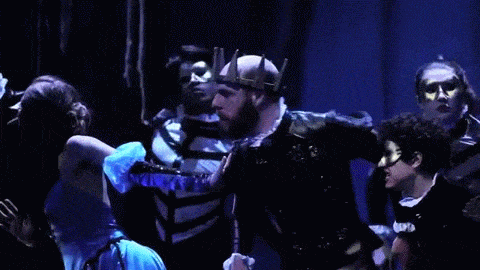The federal government has invested nearly $100,000 to bring Shakespeare to the stage—only without the legendary playwright’s words.
The National Endowment for the Arts (NEA) and its state agency the Virginia Commission for the Arts has funded numerous shows from the Crystal City-based Synetic Theater, including a production of Hamlet without words, making the title character’s "To be or not to be" soliloquy slightly less potent.
The Wall Street Journal bemoaned the dumbing down of Shakespeare, noting Shakespeare’s plays "without puns is like French cooking without butter," in a recent review of Synetic’s adaptations.
"The latest Shakespeare fashion, at least in the Washington area, is to invite people to a feast of language and serve nothing but grunts, grimaces and grins—with a few gyrations thrown in for dessert," James Bovard wrote on Monday.
"The fact that many Washingtonians consider Silent Shakespeare an improvement rather than an oxymoron reflects unkindly on the capital’s cultural pretensions," he added. "But perhaps we should not be surprised that the city that pioneered obfuscation is now exalting expunging English altogether."
Paata Tsikurishvili, Synetic Theater’s artistic director, says his inspiration comes from Charlie Chaplin. The company received taxpayer dollars to put on a pantomime version of Twelfth Night. The adaptation is set in the 1920s, and was the tenth play of Shakespeare’s the theater group has adapted without words.
Tskiurishvili has a unique perspective on the staying power of Shakespeare, who is almost universally seen as a literary genius.
"The reason Shakespeare survived so many centuries and the reason that every nation and every artist embraced Shakespeare because [sic] themes, and stories, and characters, not just only words," he said.
Nathan Weinburger, the group’s dramaturge, mentioned the Great Depression in his discussion of Synetic’s decision to set the play in the 1920s.
"The 20s is such a unique and vibrant period," Weinburger said. "Obviously, the Depression, the whole country, the whole world really was completely devastated, and that's when all the great clowns really started coming into their own, people like Chaplin and Keaton and Laurel and Hardy."
Most historians believe that the Great Depression began in 1929. The "Roaring 20s" are often noted as being a period of sustained economic growth.
Viewers can get a taste of Synetic’s versions of Shakespeare online, with video clips from the theater company’s interpretations of A Midsummer Night’s Dream, The Tempest, and Macbeth. The performances are heavy on music and dancing, but extremely light on dialogue.
Synetic describes its adaptation of Hamlet as bringing the "Prince of Denmark to life," not through his infamous soliloquy but with "remarkable mime and impressionistic choreography" and "minimalistic set and costumes."
Synetic Theater has received $60,700 from the NEA’s Virginia Commission for the Arts in 2013, as well as $15,000 from for a "movement-based wordless performance" of Twelfth Night in 2014, and $20,000 for The Tempest in 2013 from the NEA, totaling $95,700.
Separately, the theater group received $10,000 in 2009 for a "reinterpretation" of Dante’s Divine Comedy; $6,000 for a "multidisciplinary production" of Goethe’s Faust in 2006; and $10,000 for an arts program in public schools in Arlington, Va., in 2000.
A request for comment from the theater was not returned.
